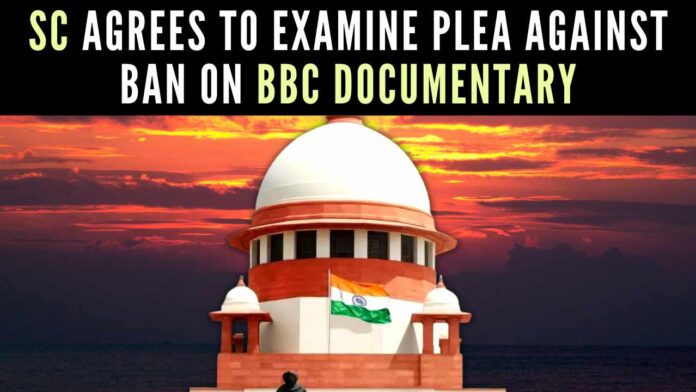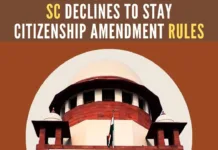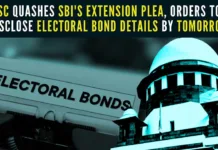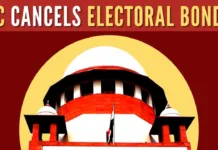
On BBC documentary row, Supreme Court to hear petitions challenging Centre’s ban on Feb 6
On Monday the Supreme Court agreed to examine a plea challenging the Centre’s ban on the BBC documentary in connection with the 2002 Gujarat Riots. The apex court will examine the plea on February 6.
The series, titled “India: The Modi Question“, has been dismissed as a biased “propaganda piece” by the government. The government has blocked the sharing of any clips from the documentary on social media. Students’ organizations and opposition parties have organized public screenings of the documentary, to protest against the ban.
Advocate M L Sharma mentioned the plea for urgent listing before a bench headed by Chief Justice of India D Y Chandrachud, and the top court agreed to hear it on February 6.
The plea, filed by Sharma, contended that the BBC documentary and was released for public view, however, due to fear of truth, the documentary has been banned from viewership in India by any means under Rule 16 of the IT Act 2021.
Sharma’s plea sought a direction for quashing the January 21 order under the IT Act being illegal, malafide and arbitrary, unconstitutional, and void ab-initio and ultra vires to the Constitution.
The documentary titled ‘India: The Modi Question’ has been banned on social media and online channels, but some students have screened it on campuses of various universities across the country.
Sharma’s plea contended that the BBC documentary reflected true facts with the original recordings of the victims of the 2002 riots as well as others concerned involved in the scenario of riots, and it can be used for judicial justice.
The top court will also hear next week, a separate petition filed by journalist N Ram, Trinamool Congress MP Mahua Moitra, and advocate Prashant Bhushan on taking down their tweets with links to the documentary.
“The contents of the BBC Documentary and the tweets by Petitioner No. 2 (Bhushan) & 3 (Moitra) are protected under Article 19(1)(a) of the Constitution of India. The contents of the documentary series do not fall under any of the restrictions specified in Article 19(2) or B restrictions imposed under Section 69A of the IT Act, 2000,” said the plea by Ram and others.
The plea by Ram and others argued that the apex court has categorically laid down that criticism of the government or its policies or even the judgment of the Supreme Court does not tantamount to violating the sovereignty and integrity of India.
“Censoring the freedom of speech and expression of the petitioners by the Executive through opaque orders and proceedings is manifestly arbitrary as it frustrates the fundamental right of petitioners to effectively seek judicial review of administrative actions under Article 226 and Article 32 of the Constitution of India in violation of the Basic Structure of the Constitution of India,” added the plea.
[With Inputs from IANS]
PGurus is now on Telegram. Click here to join our channel and stay updated with all the latest news and views
For all the latest updates, download PGurus App.
- Delhi: Stir over Biryani served on plates with Bhagwan Shri Ram’s image - April 23, 2024
- Rajasthan: PM Modi launches scathing attack on Congress; says ‘My 90-Sec Speech Created Panic’ - April 23, 2024
- Delhi Court extends Arvind Kejriwal, K Kavitha’s judicial custody till May 7 in money laundering case - April 23, 2024











Supreme Court is wasting its time & money of common citizens. It has become another instrument of beating stick for opposition and entertaining drama for the media & endless gossip talks on in the visual media. What a joke Supreme Court has become now. They should be ashamed i.e. Supreme Court is shameless.
Do not know how many lives are affected by this issue? In a country where crores of people are behind bars due to fractured justice delivery system, this issue could have waited till the burning problem of delays was addressed instead of prioritizing concerns of the rich and powerful.
What a waste of time.